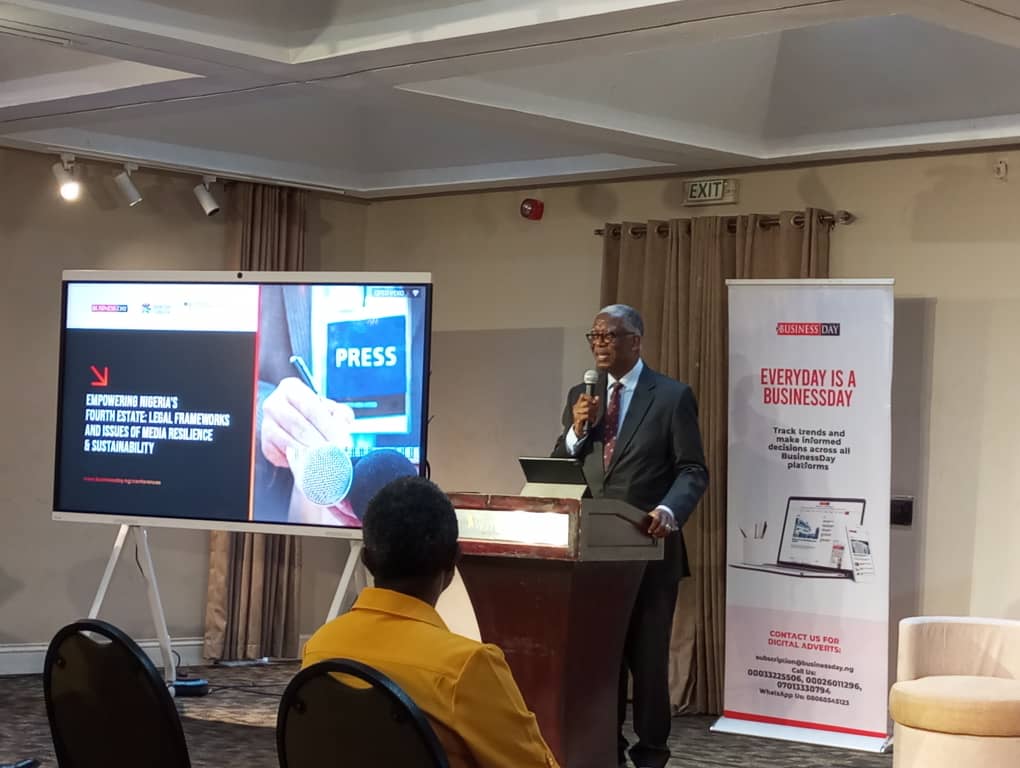Veteran journalist and media scholar, Dr Richard Ikiebe has advocated the adoption of local and community-focused journalism as the solution to the problems facing the Nigerian media.
According to him, local media, serving relevant communities with the needed content through a model customised for their indigenous realities will prevent media outfits from making the same mistakes made over the years hindering sustainability.
Dr Ikiebe, Chairman of the Business Day Newspaper Board, made the call in his keynote speech at the Policy Dialogue event held in Lagos on Thursday by the newspaper in collaboration with the BusinessDay Foundation and support of the Consulate General of the Federal Republic of Germany in Lagos.
The policy dialogue on “Empowering Nigeria’s Fourth Estate: Legal Frameworks and Issues of Media Resilience and Sustainability” featured media and legal scholars and practitioners who deliberated on the various issues plaguing the fourth estate in the country while recommending solutions.
In his keynote speech, Dr Ikiebe stressed that media has come a long way in Nigerian society and has contributed significantly to the nation as a whole. He noted the contribution of the journalism and media platforms of early, pre-independence nationalists like Herbert Macaulay, and Thomas Jackson whose works brought about the first constitution in Nigeria by then colonial governor Sir Hugh Clifford in 1922.
He however bemoaned the sharp change in the vibrant media after the attainment of independence, when it started promoting divisive regional and tribalist views which cost it a lot, especially during the subsequent military takeover.
Dr Ikiebe noted the challenges of the media to also include; the impact of deregulation and commercialisation of media in the 70s which broke down the likes of NTA and VON; the challenges of digital transition brought about by the advent of the internet, social media and now Artificial intelligence; media capture by the authorities and elites and the economic challenges making outlets struggle for funding.
{READ ALSO: “We need well-trained, resilient, innovative media professionals’}
In his view, Nigerian media’s over-reliance on external funding makes them vulnerable to manipulations and always open to special interest which may not be relevant or consequential to local realities. The shift towards sensationalism, poor journalism, the craze for virality and separatist agitation typical of a captured media also plague the Nigerian media.
The media trainer also lamented a serious lack of investment in capacity building and development of staff by several media outlets leading to a decline in the quality of media practitioners and leaders.
He said dearth of Indigenous materials and teaching resources for media subjects has led to a dependence on foreign materials which provides limited context and insight into local realities.
To address the issues plaguing the fourth estate in Nigeria, Dr Ikiebe recommended a local, community-focused media approach that writes for the people and not elite or foreign bodies.
He also called for the use of viable and localised media business models adaptable to Nigerian realities as a way to ensure survival and even sustainability.
The media trainer suggested the adoption of solutions journalism, producing reports that go beyond reporting and rehashing the problems to exploring possible and already working solutions to such problems.
[READ ALSO: Masterclass lessons on Media Career Development]


